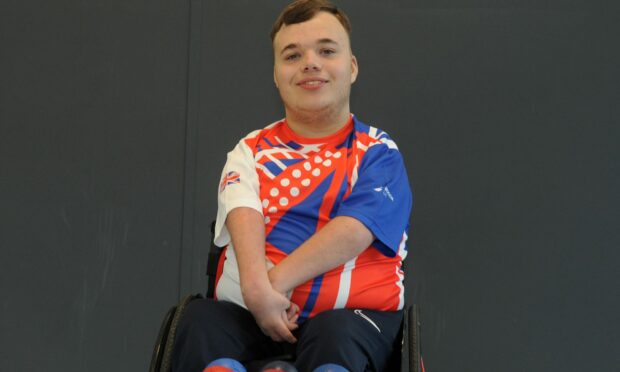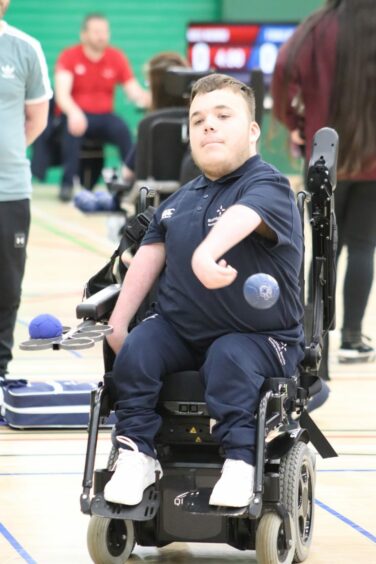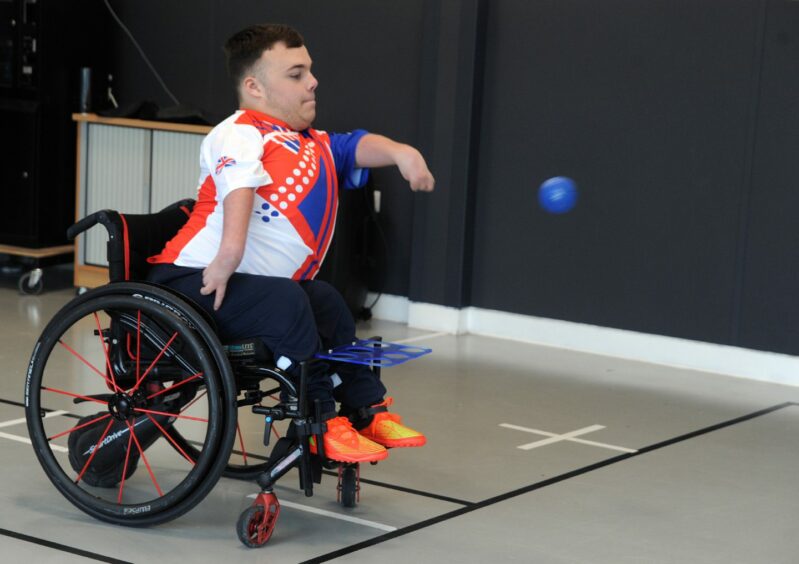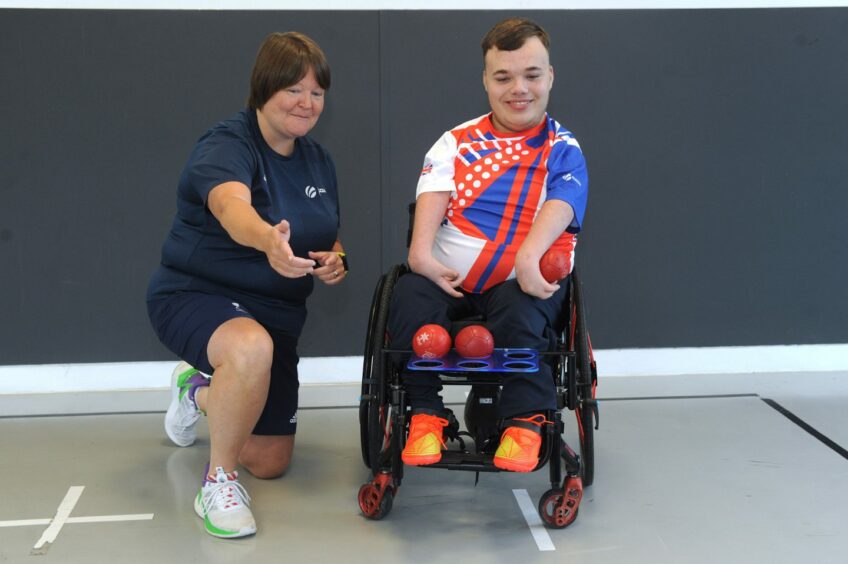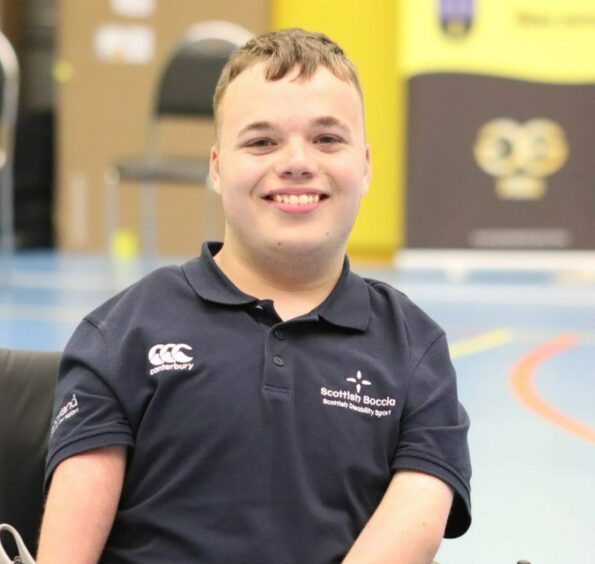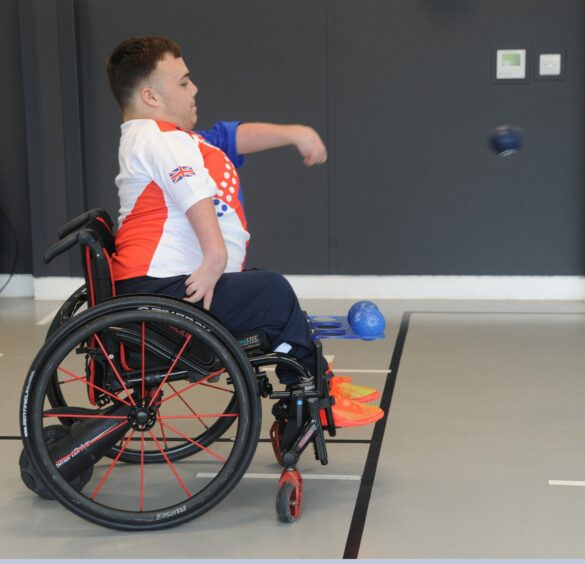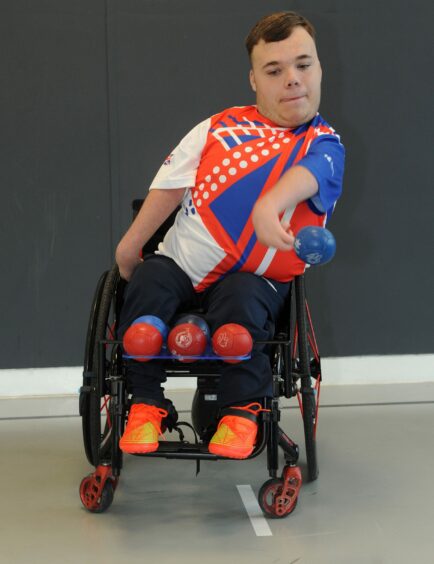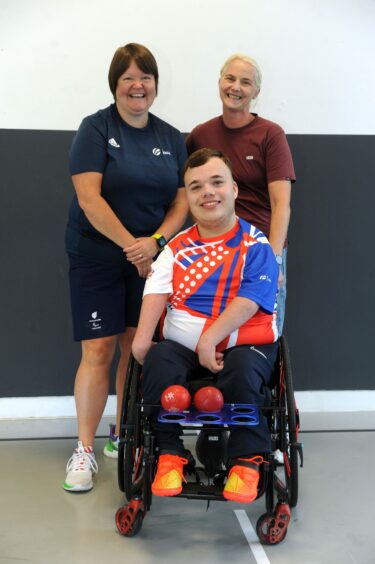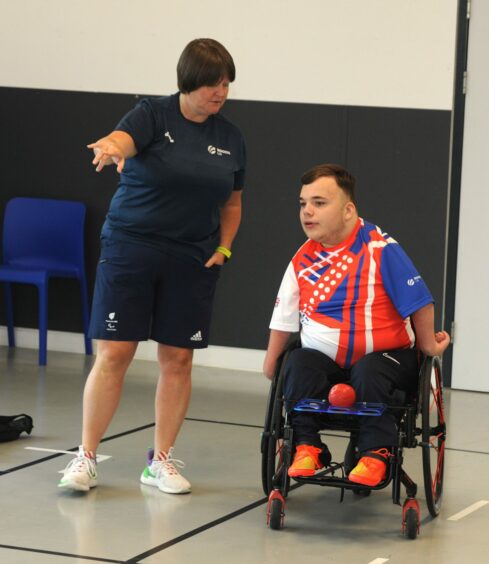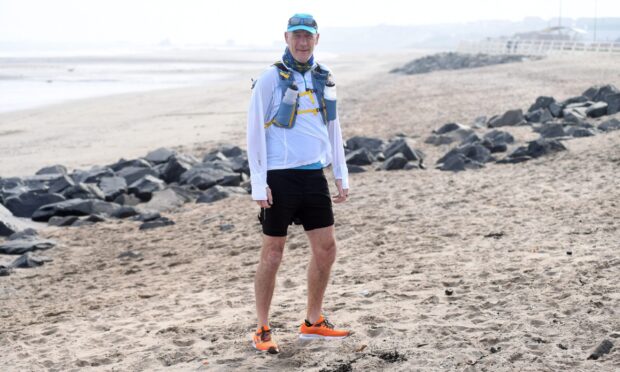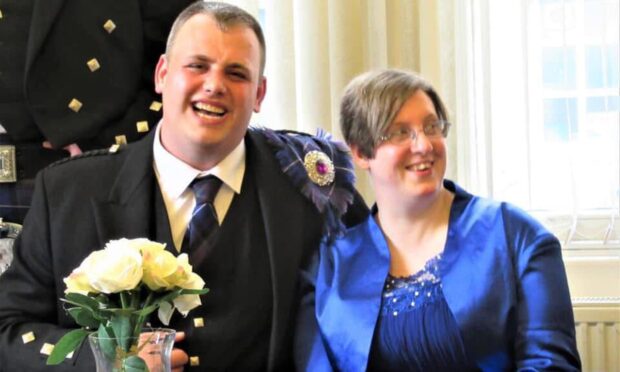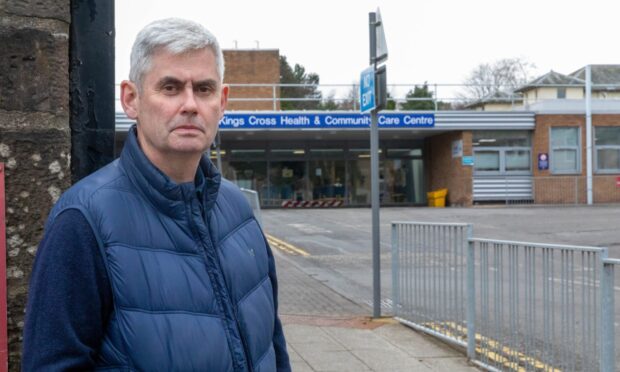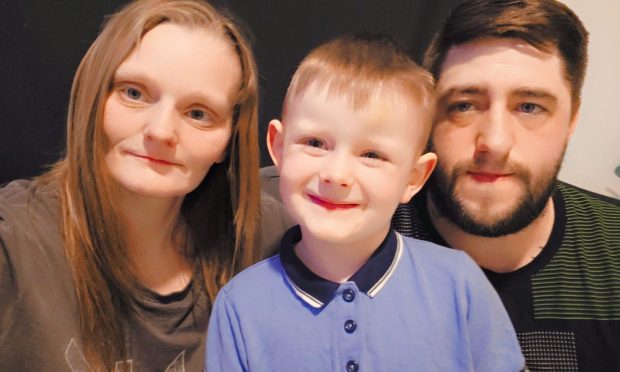Tyler McLelland was born with one of the UK’s worst cases of a rare disability called arthrogryposis.
It means the majority of his joints are locked together.
His right arm is locked straight.
What other challenges does Tyler face?
His legs are locked in a seated position.
He was born with dislocated hips.
He’s got clubbed hands and clubbed feet which are hooked and cannot be straightened.
Yet despite these difficulties, and challenges he faced at school, the Fife teenager is a model of focused determination, ambition and perseverance.
Aided by an operation which allows him to bend his left elbow, he’s found salvation through sport.
Now, he’s moved one step closer to realising his dream of becoming a Paralympian and world-class boccia player.
Competing at World Youth Championships
The 17-year-old from Windygates who studies at Fife College has been signed up by Boccia UK for its first-ever Talent Transition Squad.
He also set off this week to compete at the World Youth Championships in Portugal – and he hopes to bring back at least one medal.
“It’s a really good opportunity and I’m really buzzing,” Tyler told The Courier.
“I’m hoping to come back with a gold medal or two around my neck!
“Being realistic, my main goal is to definitely get out of my group in both singles and pairs.
“If I can go further than that I’ll be well chuffed.
“My ultimate aim is to get to the Paralympics in 2028.”
What is boccia?
Tyler is undergoing a last minute training session at the Michael Woods Sports and Leisure Centre in Glenrothes when The Courier catches up with him.
He’s being put through his paces by Fife-based coach Claire Morrison.
Boccia is a skills-based game similar to boules.
However, it’s unique in so far as it’s a disabled-persons only sport.
Players must throw, roll or kick coloured balls as close as possible to a white target ball, known as the jack.
A test of muscle control, strategy and accuracy, players can compete as an individual, pairs or as a team of three over a set number of ends.
Each side has six balls (red or blue) each end to try and score points.
Points are accumulated over the course of a match to find a winner.
How did Tyler get into boccia?
Tyler, who laughs that he used to hate sport, grew up in Woodside, Glenrothes.
He attended Carleton Primary and Auchmuty High schools.
Six years ago, he moved with his mum Emma, dad Mark and wee brother Jack to Windygates.
He recently finished a course in broadcast media at the Stenton campus of Fife College.
With ambitions to become a sports journalist, he is studying media and communications after the summer.
The Raith Rovers and Liverpool supporter currently volunteers at Stark’s Park where he writes the home game match reports for the club website.
He was recently involved in filming for a Raith Rovers 2023/24 season ticket campaign video.
He also plays power chair football with Lothian Wolves in Edinburgh and is part of the Scotland national team.
But it was his dream of getting to the Paralympics and hopefully winning a medal one day that got him into boccia aged around 10.
Boccia was recommended to Tyler
“I was giving different sports a try – athletics and wheelchair racing and stuff like that,” he said.
“None of that was really my forte.
“I wasn’t very good at stuff like that.
“So I came here to the Michael Woods centre.
“Richard Brickley the guy who was in charge of Disability Sports Fife at the time – he recommended boccia.
“He arranged for Kieran Steer – a Paralympian at the time as well – to start coaching me.”
What’s his greatest achievement so far?
Tyler says being part of the Boccia Scotland squad for the past four years has helped him get closer to “new heights” in his career.
The “main highlight” so far, he says, was winning his first ever international singles match at the Czech Open in Prague last year.
As a member of the UK transition squad, which is led by Boccia UK and is supported by Scottish Disability Sport, he can now look forward to increased opportunities to play internationally as well as training with Great Britain’s world-class players at training camps.
He takes a “lot of joy” from being able to compete at this level.
Facing difficulties in every day tasks, he’s no stranger to finding new ways to do things.
He’s grateful for the ongoing support of family, friends and his coaches.
He loves being able to show his competitive side.
How supported was he at school?
Tyler said the overall help he received around his disability at school “wasn’t too bad”.
Yet he reveals that negative experiences during his high school years have also spurred him on.
During the Covid-19 years, he said a newly laid boccia court at his high school was used as a storage room, meaning he couldn’t use it.
He says he was then told he couldn’t take part in PE because they “couldn’t adapt things”.
“It made me determined to succeed without them pretty much,” he said.
“If they are not going to help me succeed with boccia then I’ll just go ahead and succeed without you, and not give you any of the credit!”
Importance of a good mentality
Ahead of Portugal, and as the only Scottish member in the UK squad, Tyler recently returned from a training camp in Cardiff.
It was the first time he met his pairs teammate Sophie from England and a boy called Harrison, also from England.
The main competition to look out for in international tournaments tends to be players from the Far East, where boccia is further advanced.
Yet he says having a good mentality is probably a lot more important than technical ability.
“I think someone who’s really determined is the main thing,” he said.
“If you are not determined enough then there’s no point in even trying to reach a top level because determination helps you through a lot of difficult times.
“Coaches and family obviously help.
“But I’ve always been a determined person.
“All the things I’ve had to get through. That’s pushed me on more and more.”
‘More than capable’ of success
Tyler is being joined in Portugal by his mum.
But someone who’ll be keeping tabs on his progress from afar is Lisa Greasley, who lives in Dundee.
The former nursery manager, who worked in residential care, has been Tyler’s personal assistant for 18 months.
She says Tyler is “more than capable” of achieving his Paralympic dream in 2028.
“He’s very determined, very focussed and very professional!” she said.
“He doesn’t let anything ever get in the way of anything.
“He works really hard during boccia training.
“We go to the gym two or three times a week depending on the schedule.
“I say ‘if I’ve got to exercise, he’s got to exercise’!”
What does Tyler’s coach think?
Dalgety Bay-based Claire Morrison, performance coach with Boccia UK for 10 years, also helps with Tyler’s personal coaching.
The Dundee United season ticket holder, who also volunteers with Scottish Disability Sport, has been involved with boccia since around 2006.
Originally with ambitions to become a PE teacher, she started as a volunteer with Scottish Boccia to get more experience and “fell in love with the sport”.
The boccia job opportunity arose from there.
She first met Tyler six or seven years ago.
How important is access to sport?
Claire said making sport available to everyone, including disabled people, is “massive”.
“When we see sport and the impact it makes, it’s not just on the athlete themselves, but the family around them,” she said.
“Particularly for people coming into sports like boccia, there aren’t a lot of other avenues.
“It means people who are highly intelligent, high achievers and passionate about sport can find a way to do other things.
“They can mess around in the sport, can travel the world through the sport, can pursue opportunities.
“I think for me that’s where the power of it is.
“It gives a route into what sport offers rather than sending the message that sport is for ‘other’ people.”
How popular is boccia?
Boccia first went into the Paralympics in 1984.
It’s now one of the biggest Paralympic sports there is, with well over 50-odd countries playing the sport to a high level.
By coincidence, the CEO of World Boccia, Paul Trayner, lives in Cupar.
Tyler was selected for the Talent Transition Squad after demonstrating his potential to progress and compete at world-class events.
The squad comes at a time when boccia is growing and evolving globally.
In Paris next year, male and female players will compete for the first time at a Paralympic Games in separate individual events, increasing the number of medals available.
At the Zagreb Challenger earlier this year, Boccia UK topped the medal table while at the Montreal World Cup, a few weeks later, Britain scooped a gold and three bronze medals.
